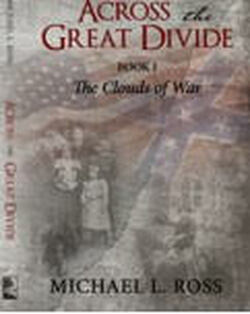Mike L. Ross sat down with me recently, and answered all my questions! Thank you Mike for taking the time. Here is what he had to say:
My wife Marti and I live in Kansas, just north of Wichita. We’re transplants from Oregon, where I used to work for Intel as a software engineer until I retired. About a year ago we decided to move south to be closer to our grandchildren. We have four of them, the oldest is five years old. When not writing, researching, and marketing books, I help other seniors at a retirement community with woodworking, and serve as a consultant for computer matters to anyone who needs it. I also enjoy running, karate, and fencing, but have slowed down in these as I get older.
 I went to Rice University in Houston back in the 1970s, and graduated with degrees in Mathematical Sciences (Computer Science) and German. I went back to school and graduated in 2011 with a master’s in software engineering from Portland State University. I taught college computer science for three years after retiring from Intel.
I went to Rice University in Houston back in the 1970s, and graduated with degrees in Mathematical Sciences (Computer Science) and German. I went back to school and graduated in 2011 with a master’s in software engineering from Portland State University. I taught college computer science for three years after retiring from Intel.
I suppose I started writing originally because of my mother – she was a high school English and Spanish teacher. I sold some short stories when I was fourteen, because she had contacts at Random House. I got back into serious writing about ten years ago, because I’m fascinated with history, and think some stories just have to be told.

Mike’s first book of the Across the Great Divide series is available soon. Read on to learn what it is about.
It’s always interesting when asked to choose a favorite anything – there are so many. However, probably my top three favorite writers are James Clavell, Tom Clancy, and Anne Perry. That’s a pretty diverse group! Clavell is just a master storyteller, and his historical fiction, like Tai Pan and Shogun are an amazing blend of meticulous research, and characters that walk off the page. I admire Clancy because of his attention to detail, vast technical knowledge, and down to earth attitude. I got into an email exchange with him once, and he conducted an impromptu session on character development that helped shape my writing. He took the time, even though I’m not a famous person. Anne Perry has mastered her era and genre to a degree rarely seen. Her Monk and Pitt series show how to keep a multi-volume series fresh, with characters growing and changing, yet every story is plausible and true to the era. Her WW1 series examines a different era, but captures the spirit of the war, and weaves new characters that engage and draw you in. I have an almost embarrassing twenty-one of her books on Kindle.
Other than just a love of history, I’ve always been attracted to learning more about the nineteenth century. My main character, William Dorsey Crump, was a real person, and I knew his granddaughter Katie when I was a kid in Lubbock, Texas. As an adult, I remembered Katy’s stories, and then started researching him—the story was just too fascinating to leave alone. Will was a Confederate cavalry soldier, a mountain man, a rancher, and a founder of both Shallowater and Lubbock, Texas. He fought under John Hunt Morgan, and participated in Morgan’s raid north into Indiana and Ohio, then spent two years in POW camps in the north. The Civil War era particularly attracted me, because I see so many parallels with today—a deeply divided country, issues of prejudice and sanctuary cities, the federal government versus state and local, and tariffs, just to name a few similar issues. The solution of that time was war – a war that killed one in five adult men in the country. My series, Across the Great Divide, is intended to explore those historical issues, and get readers thinking about how there could be better solutions today, while being true to the spirit of the times.
Probably my favorite character aside from Will is Luther, who is entirely a product of my imagination. Luther is about the same age as Will, fifteen when the story starts, but born a slave. His owners are the Clay family, granddaughter of Henry Clay. His mother and sisters are on another plantation, and run away to escape cruel treatment. Luther goes on the Underground Railroad, getting Will’s sister Albinia, another principle character, involved. Luther has to choose between the safe but debasing life of slavery, and saving his family. After his mother’s torture, he must choose between letting revenge and hate consume him, or forgiveness and love. He’s a strong man, but one driven by passions.
My historical fiction stories generally stem from an event or person in history that fascinates me. My mother taught me to write, but also to research, in an era before the internet—it’s so much easier now. I start with the event or person, and learn everything I can about it. Then I place myself, or someone I know well, in that situation, and get to know the character—of course, the character won’t be exactly the same as a real person, but that gives an outline. I write character sketches of all the principle characters—I know their birthdays, their likes and dislikes, their physical descriptions, their strengths, weaknesses, and beliefs. I write down how I want the character to grow and change through the story. Julia, Will’s oldest sister, is a good example—she starts off as just a money-grubbing golddigger looking for a rich husband, and ends up a strong woman, risking her life for others, to save her sister Albinia and act as a Union spy. Once I have my characters, I outline the book. Since most books are some form of the hero’s journey, I pay attention to whether I’m following that. I want to have a definite beginning buildup, climax, and falling action that ties together all the threads of the story. Even though I’m writing a series, I want each novel to stand on its own.
The outline sets the beginning, climax, and end for each chapter – something I learned at the Oklahoma Writer’s Conference, listening to a seminar by Adriana Mather. There are of course adjustments that happen along the way, either due to new research, new ideas, or simply a character that starts complaining to me about how they are written. The outline steers the story, and knowing my characters in advance helps me to know how they would react in a given situation.
I have several upcoming projects – I’m halfway through writing the second book of the Across the Divide series, tentatively entitled “The Search”, which takes Will west in his mountain man phase, into the middle of Red Cloud’s War. The third book will be mostly about Luther and Julia, post Civil War, and the final one follows Will up to the founding of Lubbock. I have another project started about a Civil War nurse, and yet another based on the incredible life of my mother, a rather different type of story – more of a spiritual journey and missionary biography. Across the Great Divide, Book1: The Clouds of War launches April 24 for pre-order, and release date on sale everywhere is May 14, from Harper Collins, through Amazon, Barnes and Noble, and your local bookstore. There will be Ebook, paperback and hardback editions, and a little movie trailer that Harper Collins is producing. I write about American history every day at facebook/historicalnovelsrus and my website, http://www.historicalnovelsrus. I have an email list that points out bargains in historical fiction, and gives occasional peeks at chapters in new projects.

Recent Comments